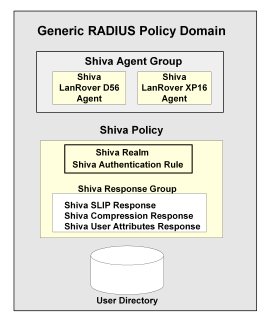A RADIUS response group is a collection of responses defined for the same type of Agent, such as Generic RADIUS. When a rule fires, all of the RADIUS responses paired with it in the response group are triggered.
The responses must be of the same Agent type in order to use the same Dictionary file. For example, you could combine two Cisco responses in the same group or two Generic RADIUS responses in the same group. However, you could not group a Generic RADIUS and a Cisco response in the same group.
The advantage of using RADIUS response groups is that it enables you to configure a policy domain using fewer policies. Instead of creating a separate realm and a separate policy for each RADIUS Agent, you could group RADIUS Agents of the same type, create one generic rule for authentication, and then group the responses for the rule. This type of configuration is shown in the following diagram:

Response groups also make it easier to add RADIUS devices to the environment. For instance, in an environment such as the one shown in the previous figure, you could quickly add another Shiva RAS to the RADIUS Agent group and this new RAS would automatically be configured with the appropriate rule and responses.
| Copyright © 2010 CA. All rights reserved. | Email CA about this topic |